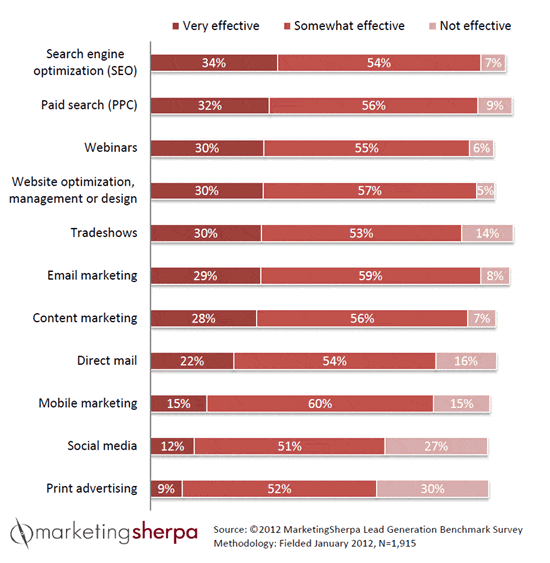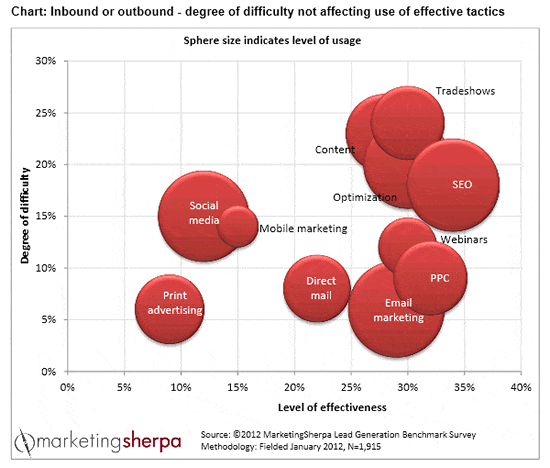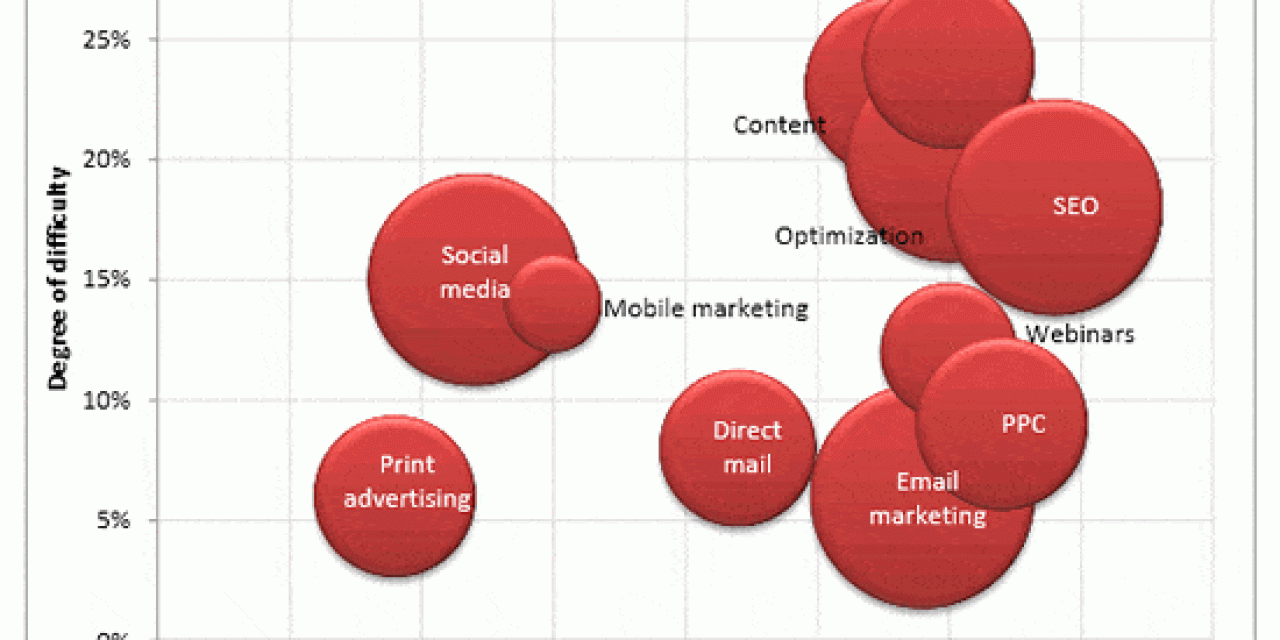How important is content marketing for lead demand generation? Research has been trying to provide the answer since quite some time. However, it also shows that the definition of content marketing matters and that content (marketing) might be underestimated from a lead generation perspective. Here is why and a different approach of looking at content for lead generation.
According to MarketingSherpa’s 2012 Lead Generation Benchmark Report, the most used lead generation tactic is email marketing, with 81% of respondents. Search engine optimization accounts for 75% and social media for 72%. Next follows another broad category, website optimization, management or design (68%). Content marketing is used by 54% of respondents, outperforming PPC and tradeshows.
Of course it’s not because a tactic is most used, that it’s also the most efficient one. End of last year MarketingSherpa’s Daniel Burstein answered some questions of readers about the findings with more data about the effectiveness of tactics and channels in driving leads.
According to the surveyed marketers, search engine optimization, ranks highest when it boils down to the most effective lead generation tactics. 29% of respondents say email marketing is very effective and 59% somewhat effective. Website optimization ranks higher than email marketing too with 30% of respondents answering it is very effective in generating leads. Mobile marketing is very effective according to 12% of respondents and somewhat effective according to a whopping 60%.
What does all this mean? In the end, the channels and tactics we use, are important. However, they should be adapted to the preferences and behavior of target audiences.

What about the effectiveness of content marketing?
The best way to generate leads is a smart cross-channel mix whereby the different aspects and dimensions of target customers are king. The survey also shows the importance of content and content marketing, as well as its effectiveness for lead generation purposes. Content marketing is very effective according to 28% of respondents and somewhat effective according to 56%.
However, here again, it’s important to remember that content marketing, email marketing, website optimization and all other tactics are closely related and intertwined. Email marketing is very efficient if the content/offer is good/relevant and if it fits in a customer-centric overall approach. There is no email marketing without content.
The same goes for mobile marketing and social media marketing. Content is a social object we interact with and spurs interaction in different possible forms and it plays a crucial role in all decisions we take, regardless of the channel.
Where does content marketing end?
Let’s look at a few examples from a lead generation perspective.
Content, lead generation and social media. When you share content with a community of people, for instance on social media, you might want to achieve different goals: relationship building, retention, loyalty and, indeed, lead generation. However, is sharing content with communities on social media social media marketing or content marketing? And what about blogging? Or creating and sharing audiovisual content or presentations via social channels? How do we split creation spend from social spend? Is it even possible?
Content, lead generation and email marketing. When you conduct email marketing programs in a cross-channel approach whereby people are invited to register for a webinar or to download a paper in a specific part of the process, you need good copy for the emails and your goal is driving leads through email and content. Is that content marketing or email marketing? And what about content for different personalized, segmented and triggered emails in a scenario-based marketing process? There’s a lot of content to create in order for these emails. In fact, there is a huge demand for relevant and timely content for email marketing and cross-channel marketing. So, is this really about content marketing or email marketing?
Content, lead generation and marketing optimization. A final example: optimization, including website optimization, search engine optimization and in general marketing and conversion optimization. We just saw how important they are from a lead generation perspective in the chart. What is one of the key elements we test and improve in order to have better converting websites? Indeed, content. What is search engine optimization increasingly about? Indeed, content (marketing).
I could continue for a while and say that for mobile maketing (which means many things) you need content too but my point is that it’s very hard to separate content in the broad sense as a ‘discipline’ from all the other tactics MarketingSherpa mentions. What is content marketing? Are all the examples I just gave excluded from it? How do respondents even know that when asked how effective they think content marketing is?
I guess you see my point. Content marketing in the broad sense of providing content to improve marketing outcomes by focusing on customer needs and preferences seems underestimated in the survey. I think the chart below makes that clear, especially as in the report excerpt it’s announced as “evaluating the use, difficulty and effectiveness of various lead generation channels, to help you identify your optimal, multichannel mix”. Is content (marketing) a channel? Is it even a separate tactic, taking into account what I wrote before?

Content matters in each individual journey
Maybe we should focus less on channels and tactics as I keep saying and reverse the view: it’s about experiences, needs and goals. It’s about the customer, not about tactics. It’s about integration and – indeed – an optimal multichannel mix as MarketingSherpa calls it.
It’s OK to see what marketers think about content and content marketing for reports such as this one. But at the same time it’s essential to see that content plays a role everywhere, even in this limited scope of lead generation. Content matters in experiences, needs and goals.
We need to get in that spirit of putting the customer first and having an approach whereby optimization is a continuous mission. It’s not about website optimization, search engine optimization, email marketing, social media marketing etc. It’s about the optimization of the experiences – and thus conversions – of the multichannel customer, based on what he needs. Content marketing needs that integrated approach too as it is not a one-off and single-channel or even single-purpose set of tactics.
In the end, the overall results matter. And they are a question of integrating around the customer, regardless of general thoughts on the most effective channels and beyond lead generation. Your business is unique and so are your customers and prospects. Efficiency is a matter of outcomes and the result of customer-centricity.
And, no matter how you look at it, content is essential in all dimensions of the individual buying journey, customer life cycle and marketing goals.






